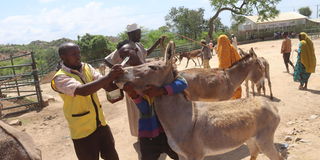Stop drugging donkeys with bhang, Moyale residents told

Veterinary Services Officers vaccinate donkeys during a donkey vaccination clinic courtesy of African Animal Network Welfare and WTG on March 29, 2023
More than 1,000 donkeys in Moyale have been vaccinated against rabies and tetanus, as the owners were warned against drugging them with bhang to work harder and longer.
The animals were also dewormed in Qalaliwe and Somare.
Moyale Donkey Owners’ Welfare Group Chairperson Nurr Mahat on Wednesday decried the rampant mistreatment and abuse of the animals.
Speaking to Nation.Africa during the Donkeys Vaccination Clinic at Moyale Livestock Market, Mr Mahat expressed concerns over the move by some donkey owners to give them bhang-infused food.
“We are concerned about the level of brutality and abuse meted out on donkeys by some of the owners as others have gone to the extent of getting their donkeys high on bhang to work for longer hours and harder,” Mr Mahat said.
Despite the immense benefits the communities gained from the animals ranging from transportation, exchange for the trade value chain, or dowry payment, donkeys are still largely abused in the region.
Mr Mahat called on locals to give donkeys physical and psychological care and protection as well as medical attention like other domestic animals.
He hinted that Moyale Donkey Welfare Group was currently in talks with their lawyer on how to draft a Bill to be tabled in the Marsabit County Assembly to help eradicate donkey abuse and mistreatment.
Similar concerns were echoed by the Moyale Donkey Welfare Group Treasurer Hawo Gulleid, who lamented that despite the immense support on livelihoods, the animals have been neglected and suffer diverse welfare challenges at the hands of their handlers.

Veterinary Services Officers vaccinate donkeys during a donkey vaccination clinic courtesy of African Animal Network Welfare and WTG on March 29, 2023.
She regretted that many donkeys in the region had wounds on their bodies due to the brutal treatment they get from their handlers.
Others transport diesel using donkeys, exposing them to bodily harm.
Ms Gulleid was concerned about the drastic decline in the number of donkeys due to the recent drought and trafficking at the border.
She called on donkey advocacy organisations and the government to take immediate action against the brutalities that donkeys suffer.
She further appealed for frequent vaccination drives and the provision of donkey feeds by the government, with needy households, especially the women-led ones, relying on the animals to educate their children.
Mr Gambole Jirma appealed to the government and other animal advocacy groups to undertake extensive awareness and sensitization about donkey welfare across Marsabit County.
They also asked for sponsorship to tour other areas with many donkeys, such as Lamu, to learn how to protect them.
Africa Animal Network Welfare Programme Officer Dennis Bahati said donkeys were the most neglected domestic animals in northern Kenya.
He expressed concern over the rampant abuse of donkeys in Moyale sub-county.
He downplayed the perception that donkeys could work more effectively by being intoxicated on marijuana.
He explained that as an animal expert feeding animals on marijuana in any form was inadvisable and exposed even the handlers themselves to several risks.

African Animal Welfare Network Welfare (ANAW) Programs Officer Dr Denniss Bahati during an interview at Sessi area in Moyale on March 2023.
“We want to demystify the myth and perception that donkeys fed on bhang can work harder and longer and want to strongly discourage the handlers who engage in such activities as they expose their donkeys to immense risks,” Mr Bahati said.
Research done between 2018 and 2022 by Michigan State University College of Veterinary Medicine and Kansas State University’s College of Veterinary Medicine established that bhang had serious psychoactive effects on donkeys.
Male and female donkeys that were subjected to the test exhibited elevated heart rates, lethargy, and longer comedown periods after ingesting marijuana-infused edibles.
The study noted that both donkeys recovered from the intoxication between 24 and 44 hours after reaching their peak potency.
The female donkey exhibited symptoms of intoxication such as staggering that lasted for 44 hours while the male donkey’s symptoms lasted for 24 hours.
A similar test carried out on pets such as cats and dogs established that dogs have more cannabinoid receptors in their brain thus exposing them to dramatic effects and potential intoxication as compared to humans.
The experiments established that animals process many compounds differently from humans and consequently, many foods and medications that are safe for humans could pose great threats to them.
Some of the compounds that are safe for humans and risky for pets’ ingestion include acetaminophen, ibuprofen, raisins and grapes, macadamia nuts, chocolate, and the artificial sweetener xylitol.





